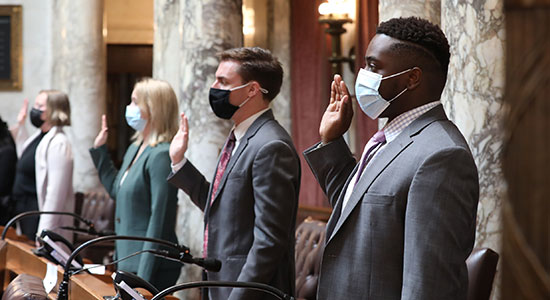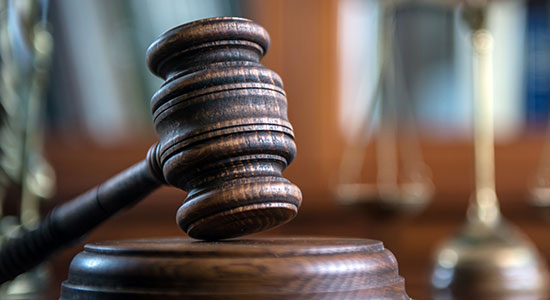Good Idea
Adding Civility to the Oath of Admission

Photo: On May 24, 2021, 158 Marquette University Law School graduates took the Attorney’s Oath and signed the Supreme Court Roll, admitting them to the practice of law.
Last month, the West Virginia Supreme Court adopted new “civility” language to the oath that all lawyers take when they are admitted to practice law.
Under the new oath, lawyers would vow to conduct themselves “with integrity, dignity and civility and show respect toward judges, court staff, clients, fellow professionals and all other persons.”
“As I think back over my legal career, the overwhelming impression I have had of other attorneys is not how well they argued a case or how successful they are but how they treated the opposing side, the clients, the individual jurors and witnesses, the people they come into contact with as part of their professional career,” one justice wrote in a statement from the court. “It’s an incredibly important principle we need to stress to new lawyers joining the Bar – the importance of civility.”
One justice noted that less than half the states have updated their attorney oaths with language on civility. Wisconsin’s attorney oath, recently administered to more than 300 new law school graduates, does not mention civility directly.
“At a time when political discourse is increasingly acerbic and a great many human interactions are devoid of the civility that is common in our profession, hopefully this highlighting of civility within the Bar will serve as a useful example,” said another justice of the West Virginia Supreme Court.
Source: Associated Press; courtswv.gov
Got a Nugget to Share?
Send your ideas for interesting facts, trends, tips, or other bits and bytes to wislawmag@wisbar.org, or comment below.
Tech Tip
Upgrade Your Social Media Account Security

An increase in social media account compromises has left some Wisconsin lawyers scrambling to recover their accounts, especially those who communicate with their clients through these platforms.
Problems commonly occur when users click on suspicious links, download corrupted attachments, or reuse passwords that have been compromised in data breaches.
Enabling two-factor authentication and having strong, unique passwords for each social media account can help thwart attempts to hack your accounts. Both options are free and you can find instructions on how to enable two-factor authentication by visiting the help page of your social media account provider.
If your account is accessed, the hackers will likely create posts and send messages to your contacts in an attempt to access their accounts, too.
Hackers also may change your social media account’s email address and password. If this occurs, visit the help page of your social media account provider to learn how to recover your compromised account.
Source: Christopher C. Shattuck, Practice Management Advisor (Practice 411™), State Bar of Wisconsin
Quotable
“Treat every person the way you treat your bratwurst.”

– Comedian Charlie Berens, host of the Manitowoc Minute, with special advice for U.W.- Madison graduates.
“By that I mean if someone falls down, it don’t mean they’re bad. It just means they gotta be rinsed off with beer and tossed right back onto the grill of life.”
Source: U.W.-Madison
Out There
Driverless Cars: No Sleeping on Auto-Pilot

A man driving through Kenosha in May received a traffic citation for sleeping at the wheel of his Tesla, which he had on “auto-pilot” while driving on I-94.
More and more vehicles are testing and using autonomous features. Lawyers will increasingly be called on to resolve liability issues when accidents involving driverless vehicles happen. For instance, authorities confirmed that no one was driving a Tesla Model S that crashed last month in Texas and killed two passengers when it veered off the road and hit a tree.
According to the National Highway Traffic Safety Administration (NHTSA), liability and auto insurance coverage issues “are among many important questions beyond the technical considerations that policymakers are working to address before automated vehicles are made available.”
The NHTSA says we are still many years away from fully automated vehicles becoming available to the public.
Source: TMJ4; Fast Company
By the Numbers
25%
– The number of women lawyers who report that they thought about leaving the legal profession due to mental health concerns, versus 17 percent of men, in a recent research article.
The article, “Stress, Drink, Leave: An Examination of Gender-specific Risk Factors for Mental Health Problems and Attrition Among Licensed Attorneys,” was published recently by the Public Library of Science.
Researchers conducted a survey of nearly 3,000 lawyers within the California Lawyers Association and the D.C. Bar.
The survey also revealed that almost 35 percent of women and 29 percent of men report that their drinking increased during the pandemic.
“Of the female respondents, 55.9% screened positive for risky drinking, and 34% for hazardous drinking,” noted an ABA Journal article about the research.
“For male respondents, 46.4% screened positive for risky drinking, and 25.4% for hazardous drinking.”
WisLAP Can Help
WisLAP offers confidential assistance to lawyers, judges, law students, and their families who are suffering from issues affecting their well-being and law practice. 24-hour helpline: (800) 543-2625
On the Radar
Legal Malpractice Claims on the Rise?

From 2019 to mid-2020, legal malpractice claim payouts were at an all-time high, according to a survey by Ames & Gough, an insurance broker.
Ames & Gough surveyed 11 legal professional liability insurers that cover 80 percent of the largest 250 law firms in the country. While the payouts were larger in the last two years, the frequency of claims remained flat, but the economic downturn from the pandemic may lead to more claims, according to the report.
The largest number of legal malpractice claims was tied to trusts and estates, reflecting the “sheer volume of engagements involving the baby boomer generation as they continue the largest transfer of wealth in U.S. history.”
Brian Anderson, senior claims attorney for Wisconsin Lawyers Mutual Insurance Co. (WILMIC) says, in general, the severity of claims has not increased in Wisconsin, but that may change.
“Comparing raw numbers, 2019 indemnity payments were about 8 percent higher than WILMIC’s five-year average, and 2020 indemnity payments were about 20 percent lower than the average during that same time period,” he said.
But WILMIC has begun to see an upward trend in claims reported for the first quarter of 2021.
“Looking forward, we do expect to see additional claims arising out of this pandemic,” said WILMIC claims attorney Matt Beier.
For more on practice area risks, see “2020’s Top 5 Risky Practice Areas” in the February Wisconsin Lawyer.
Source: Insurance Journal, WILMIC
